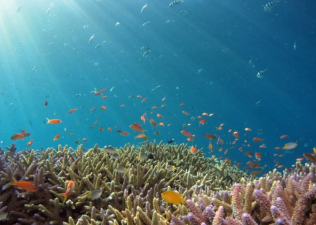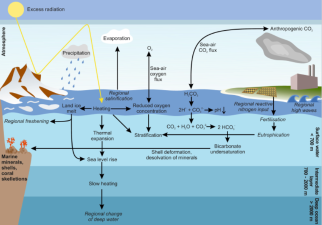The Role of Oceans in the Global Ecosystem
The ocean, occupying the vast majority of Earth's surface, is home to a diverse array of biodiversity and complex ecosystems.
The importance of marine ecosystems lies in maintaining the balance of Earth's biodiversity, regulating the stability of the climate system, providing resources essential for human life, and playing a crucial role in ecological protection and regulation.
The ocean is Earth's climate regulator
The ocean absorbs significant amounts of carbon dioxide, slowing the rate of global warming. Its heat capacity stabilizes the global climate, preventing frequent extreme weather events. Ocean currents transfer heat from the equator to the poles, ensuring a relatively even distribution of temperatures. If this regulating function of the ocean is impaired, climate balance will be disrupted, leading to more frequent disasters such as hurricanes and droughts.
Phytoplankton contributes to over half of Earth's oxygen. Their photosynthesis not only supports the marine food chain but also directly impacts the survival of terrestrial life. When ocean acidification or temperatures rise, these tiny organisms decline dramatically, ultimately leading to fluctuations in atmospheric oxygen levels.
Provides Abundant Resources
The ocean is a vital resource reservoir for humanity, providing a wealth of food, energy, minerals, and medicines. Many fishing economies rely on the ocean. People harvest a variety of seafood from the ocean, meeting the protein and nutritional needs of billions of people worldwide. The ocean also contains rich mineral resources and potential marine energy, offering unlimited possibilities for human future development.
The Important Role of Ecological and Environmental Protection
Marine ecosystems are a vital component of Earth's ecosystems and are crucial for maintaining global biodiversity and ecological balance. Marine ecosystems also act as environmental regulators, purifying water quality, stabilizing coastlines, maintaining ecological balance, and protecting the living environment of other organisms and humans on Earth.
The Importance of Protecting Marine Ecosystems
Protecting marine ecosystems is crucial for maintaining Earth's ecological balance and sustainable human development. We can protect marine ecosystems through the following:
- Reducing Pollution: Reduce land-based pollutant emissions, especially hazardous substances and plastic waste, to minimize harm to marine life.
- Managing Fishery Resources: Establish sustainable fisheries management measures, including catch limits, prohibiting illegal fishing, and protecting important breeding grounds.
- Establishing Marine Protected Areas: Designate marine protected areas to protect important ecosystems such as coral reefs and seagrass beds and limit damage to these areas by human activities.






